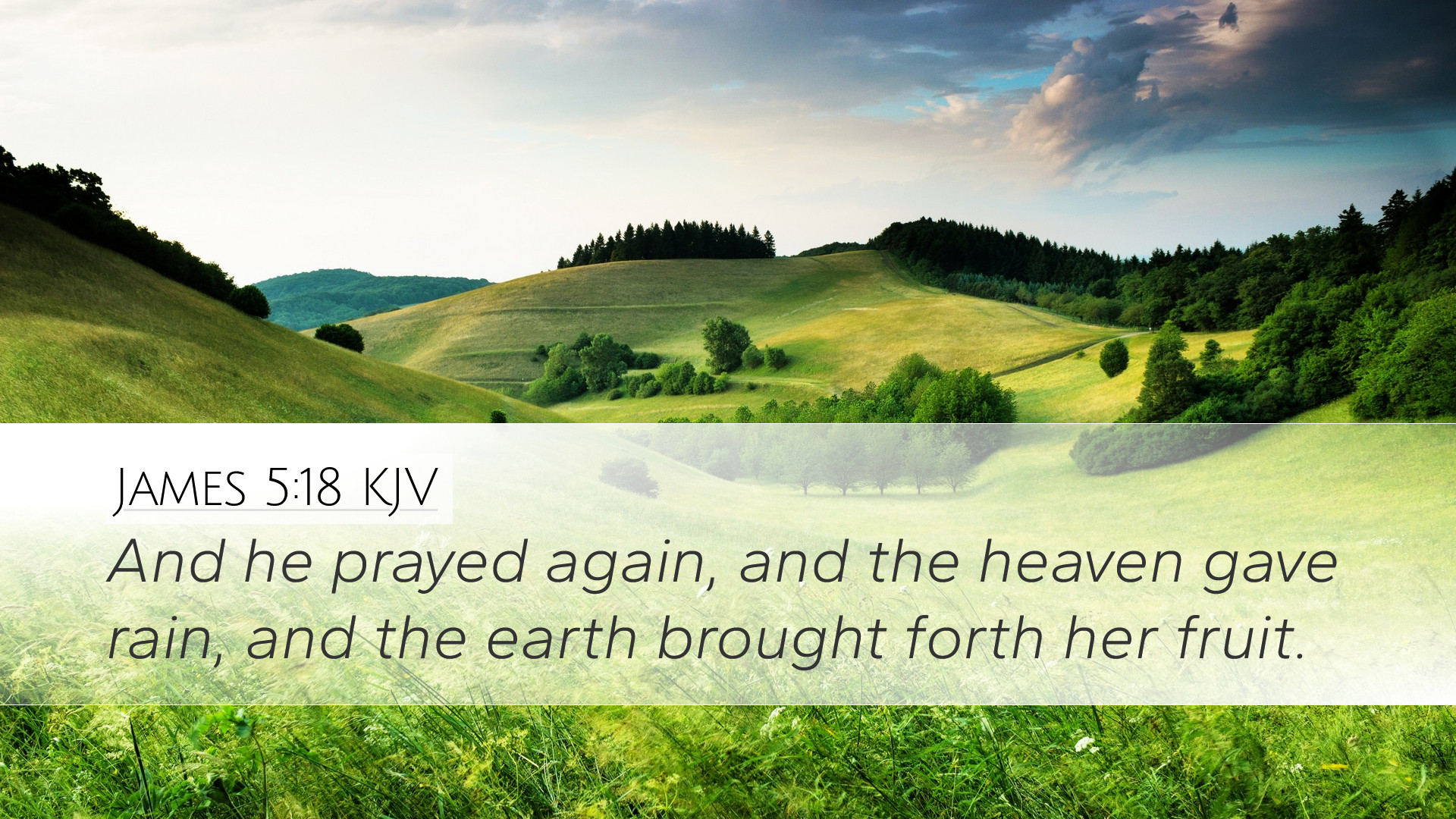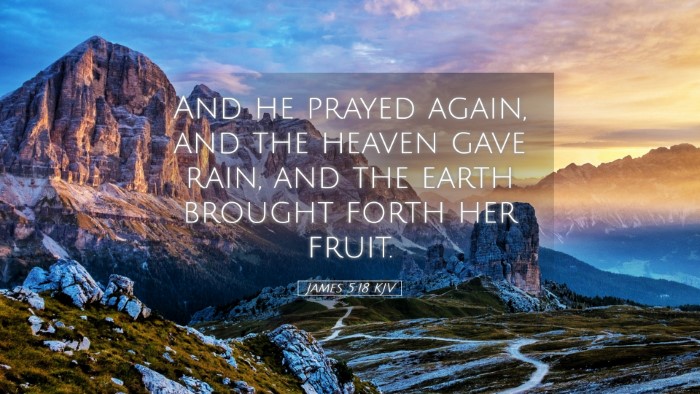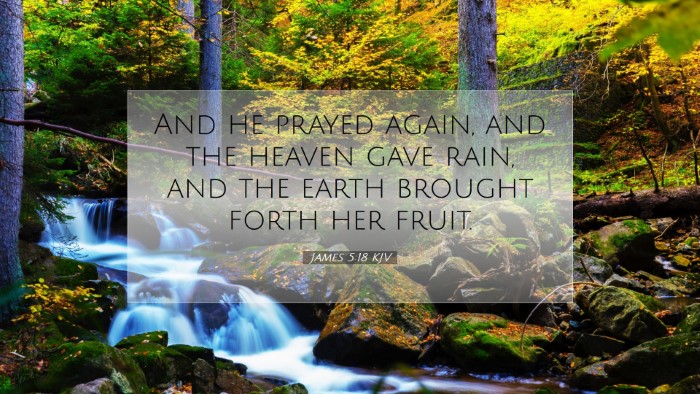Old Testament
Genesis Exodus Leviticus Numbers Deuteronomy Joshua Judges Ruth 1 Samuel 2 Samuel 1 Kings 2 Kings 1 Chronicles 2 Chronicles Ezra Nehemiah Esther Job Psalms Proverbs Ecclesiastes Song of Solomon Isaiah Jeremiah Lamentations Ezekiel Daniel Hosea Joel Amos Obadiah Jonah Micah Nahum Habakkuk Zephaniah Haggai Zechariah MalachiJames 5:18
James 5:18 KJV
And he prayed again, and the heaven gave rain, and the earth brought forth her fruit.
James 5:18 Bible Commentary
Commentary on James 5:18
Verse: "And he prayed again, and the heaven gave rain, and the earth brought forth her fruit."
Contextual Overview
The epistle of James, written by James the brother of Jesus, is known for its practical application of faith in daily life. Chapter 5 serves as a conclusion to the letter, where the author addresses patience in suffering, the power of prayer, and the effectiveness of sincere faith. Verse 18 specifically illustrates the power of prayer through the example of Elijah, emphasizing that fervent prayer can lead to divine intervention.
Insights from Matthew Henry
Matthew Henry emphasizes the efficacy of Elijah’s prayers, drawing attention to the nature of prayer itself. He notes that Elijah, a man subject to like passions as we are, fervently prayed for rain. His prayer was not merely ritualistic but was a heartfelt plea to God, showcasing the human side of this prophet.
- Humanity of Elijah: Henry points out that Elijah's experience demonstrates that any faithful believer has access to the same power in prayer. He argues that it is essential for believers to understand their connection to God's redemptive work through prayer.
- Divine Response: The emphasis on God's response highlights His sovereignty. The rain that followed Elijah’s prayer serves as a testament to God's willingness to respond to His people's needs, illustrating the relationship between human intercession and divine action.
Insights from Albert Barnes
Albert Barnes provides a historical and theological perspective on this verse, suggesting that the reference to Elijah serves to encourage believers in their own prayer life. He explains the specific context of Elijah's prayer in 1 Kings, where the prophet sought rain after a period of drought, reflecting Israel's strife and need for repentance.
- Prayer as a means of grace: Barnes points out that prayer is not just a means of supplication but also a means of grace. It connects the believer with God's will and purpose.
- Encouragement for Believers: He encourages believers to be persistent and earnest in their prayers, noting that the fervency of prayer is key. This verse serves as a reminder that when believers pray with sincerity and faith, significant outcomes can follow.
Insights from Adam Clarke
Adam Clarke takes a linguistic and thematic approach, expanding on the meaning of "prayed again." He suggests that Elijah's continual intercession reflects a model for Christian prayer, emphasizing consistency and faithfulness in seeking God.
- The significance of repetition: Clarke notes that the repetition in Elijah's prayer signifies persistence. It serves as an illustration that believers are called to maintain faith and commitment in their prayer life, not merely through one-off requests.
- The impact on creation: Clarke elaborates on the consequence of Elijah’s prayer—it affected not just the spiritual realm but also the physical world, leading to rain and resultant fertility in the earth. This signifies the holistic impact of prayer on both the spiritual and physical realms.
Theological Implications
This verse serves as a powerful affirmation of the principle that prayer is an instrument through which God works. Theologically, it emphasizes key doctrines:
- Sovereignty of God: While human prayer is essential, ultimately, it is God who decides how and when to act. This affirms God's authority and control over creation.
- Nature of Faith: The verse underscores the relationship between faith and action. True faith leads to earnest prayer, and earnest prayer influences God's will.
- Role of the Believer: Believers are encouraged to act as intercessors. This task is an integral part of Christian life and shows the role of believers in God’s redemptive history.
Practical Application
For pastors, students, and theologians, this verse challenges them to consider their own prayer lives. Emulating Elijah’s example involves:
- Developing a Habit of Prayer: Just as Elijah prayed continually, believers are encouraged to develop a consistent and fervent prayer life.
- Focusing on God’s Will: Prayer should align with seeking God’s will rather than personal desires alone.
- Engaging in Community Prayer: Elijah’s prayer was corporate in nature; Christians are called to pray for one another and the needs of their community, reminding them of their interconnectedness in Christ.
Conclusion
In summary, James 5:18 illustrates the profound relationship between earnest prayer and divine action. The examples from Elijah’s life, as expounded by Matthew Henry, Albert Barnes, and Adam Clarke, provide both theological depth and practical guidance for believers. As one contemplates the power of prayer, may they be encouraged to engage deeper in their communication with God, confident that their prayers can lead to thunderstorms of divine grace and rain upon parched lives.


